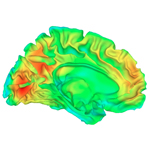Brain-based disorders present a severe public health challenge. Scientists in the Center for Clinical and Cognitive Neuroscience have broad and extensive expertise in the neuropsychology and neuroscience of a number of developmental conditions, including autism spectrum disorder (ASD), fetal alcohol spectrum disorders (FASD), and attention-deficit/hyperactivity disorder (ADHD).
 These conditions are highly prevalent in California and around the world. Recent prevalence estimates have been 2-5% for FASD in U.S. children, 6.2% for ADHD in California children, and up to 2.6% for ASD in industrialized countries. Current NIH funding priorities in FASD, ASD, and other developmental conditions include identification of genetic and epigenetic factors influencing development of cognitive deficits and development and implementation of targeted intervention and treatment strategies.
These conditions are highly prevalent in California and around the world. Recent prevalence estimates have been 2-5% for FASD in U.S. children, 6.2% for ADHD in California children, and up to 2.6% for ASD in industrialized countries. Current NIH funding priorities in FASD, ASD, and other developmental conditions include identification of genetic and epigenetic factors influencing development of cognitive deficits and development and implementation of targeted intervention and treatment strategies.
A related area of strong expertise among SDSU faculty is in the study of language processing and its disorders, which are known to have enormous physical, emotional, and financial consequences for those individuals and families affected. For example, congenital and early deafness has a significant impact on the acquisition of literacy skills – only 10% of deaf adults read above the eighth grade level, and such low literacy rates severely reduce economic, social and academic opportunities for deaf individuals.
 Understanding the neural circuitry for deaf readers and the factors that affect its development are critical to developing appropriate intervention mechanisms, and NIDCD’s strategic plan specifically targets reading research for deaf and hard-of-hearing individuals (including the neurobiological profiles of atypical reading). Specific language impairment (SLI) is a language disorder that delays the mastery of language skills in children who have no hearing loss or other developmental delays. SLI is one of the most common childhood learning disabilities, affecting approximately 7% of children. The impact of SLI persists into adulthood. Aphasia is a language disorder that often results suddenly from stroke or traumatic brain injury, but can also appear over time due to dementia, tumor or brain infection. These language disorders impair an individual’s ability to produce and/or understand expressive and written language. It is currently estimated that approximately 80,000 individuals acquire aphasia each year from strokes alone with about one million people in the United States currently having aphasia.
Understanding the neural circuitry for deaf readers and the factors that affect its development are critical to developing appropriate intervention mechanisms, and NIDCD’s strategic plan specifically targets reading research for deaf and hard-of-hearing individuals (including the neurobiological profiles of atypical reading). Specific language impairment (SLI) is a language disorder that delays the mastery of language skills in children who have no hearing loss or other developmental delays. SLI is one of the most common childhood learning disabilities, affecting approximately 7% of children. The impact of SLI persists into adulthood. Aphasia is a language disorder that often results suddenly from stroke or traumatic brain injury, but can also appear over time due to dementia, tumor or brain infection. These language disorders impair an individual’s ability to produce and/or understand expressive and written language. It is currently estimated that approximately 80,000 individuals acquire aphasia each year from strokes alone with about one million people in the United States currently having aphasia.
 Furthermore, stroke incidence is expected to increase to an estimated 1.14 million/year in 2025. According to the NIDCD’s strategic plan, funding priority has been placed in four core areas including identification of genetic and epigenetic factors that contribute to language impairments, the changes in brain structure and functioning in response to behavioral, pathologic, or environmental insult; and the efficacy of evidence-based intervention.
Furthermore, stroke incidence is expected to increase to an estimated 1.14 million/year in 2025. According to the NIDCD’s strategic plan, funding priority has been placed in four core areas including identification of genetic and epigenetic factors that contribute to language impairments, the changes in brain structure and functioning in response to behavioral, pathologic, or environmental insult; and the efficacy of evidence-based intervention.
The disorders described above have a significant public health, social, and economic impact (e.g., autism alone has an estimated annual cost to U.S. society exceeding $100 billion, and long-term management of disabled stroke patients costs upwards of $35 billion per year). Our CCN faculty and affiliates have excellent expertise in the systems-level understanding of these disorders and their linguistic and cognitive underpinnings.

Recent Comments